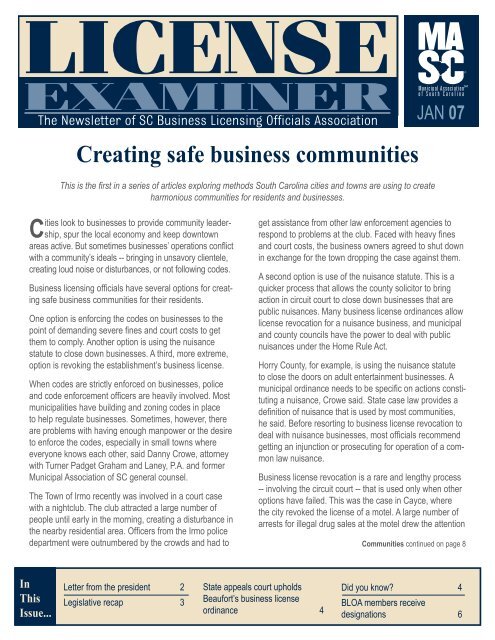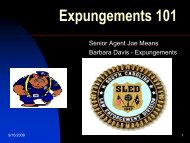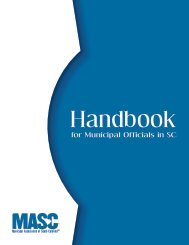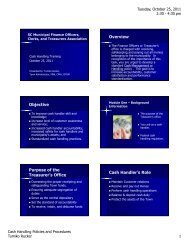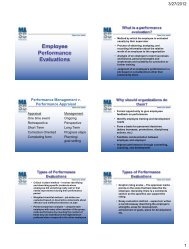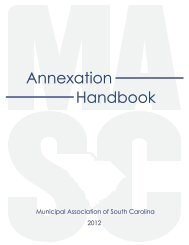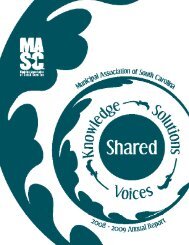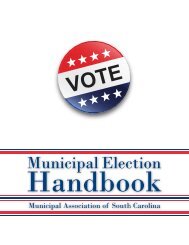January - Municipal Association of South Carolina
January - Municipal Association of South Carolina
January - Municipal Association of South Carolina
You also want an ePaper? Increase the reach of your titles
YUMPU automatically turns print PDFs into web optimized ePapers that Google loves.
Creating safe business communities<br />
This is the first in a series <strong>of</strong> articles exploring methods <strong>South</strong> <strong>Carolina</strong> cities and towns are using to create<br />
harmonious communities for residents and businesses.<br />
Cities look to businesses to provide community leadership,<br />
spur the local economy and keep downtown<br />
areas active. But sometimes businesses’ operations conflict<br />
with a community’s ideals -- bringing in unsavory clientele,<br />
creating loud noise or disturbances, or not following codes.<br />
Business licensing <strong>of</strong>ficials have several options for creating<br />
safe business communities for their residents.<br />
One option is enforcing the codes on businesses to the<br />
point <strong>of</strong> demanding severe fines and court costs to get<br />
them to comply. Another option is using the nuisance<br />
statute to close down businesses. A third, more extreme,<br />
option is revoking the establishment’s business license.<br />
When codes are strictly enforced on businesses, police<br />
and code enforcement <strong>of</strong>ficers are heavily involved. Most<br />
municipalities have building and zoning codes in place<br />
to help regulate businesses. Sometimes, however, there<br />
are problems with having enough manpower or the desire<br />
to enforce the codes, especially in small towns where<br />
everyone knows each other, said Danny Crowe, attorney<br />
with Turner Padget Graham and Laney, P.A. and former<br />
<strong>Municipal</strong> <strong>Association</strong> <strong>of</strong> SC general counsel.<br />
The Town <strong>of</strong> Irmo recently was involved in a court case<br />
with a nightclub. The club attracted a large number <strong>of</strong><br />
people until early in the morning, creating a disturbance in<br />
the nearby residential area. Officers from the Irmo police<br />
department were outnumbered by the crowds and had to<br />
JAN 07<br />
get assistance from other law enforcement agencies to<br />
respond to problems at the club. Faced with heavy fines<br />
and court costs, the business owners agreed to shut down<br />
in exchange for the town dropping the case against them.<br />
A second option is use <strong>of</strong> the nuisance statute. This is a<br />
quicker process that allows the county solicitor to bring<br />
action in circuit court to close down businesses that are<br />
public nuisances. Many business license ordinances allow<br />
license revocation for a nuisance business, and municipal<br />
and county councils have the power to deal with public<br />
nuisances under the Home Rule Act.<br />
Horry County, for example, is using the nuisance statute<br />
to close the doors on adult entertainment businesses. A<br />
municipal ordinance needs to be specific on actions constituting<br />
a nuisance, Crowe said. State case law provides a<br />
definition <strong>of</strong> nuisance that is used by most communities,<br />
he said. Before resorting to business license revocation to<br />
deal with nuisance businesses, most <strong>of</strong>ficials recommend<br />
getting an injunction or prosecuting for operation <strong>of</strong> a common<br />
law nuisance.<br />
Business license revocation is a rare and lengthy process<br />
-- involving the circuit court -- that is used only when other<br />
options have failed. This was the case in Cayce, where<br />
the city revoked the license <strong>of</strong> a motel. A large number <strong>of</strong><br />
arrests for illegal drug sales at the motel drew the attention<br />
Communities continued on page 8<br />
In<br />
This<br />
Issue...<br />
Letter from the president 2<br />
Legislative recap 3<br />
State appeals court upholds<br />
Beaufort’s business license<br />
ordinance 4<br />
Did you know? 4<br />
BLOA members receive<br />
designations 6
Letter from the BLOA president<br />
This year BLOA celebrated its 20th year <strong>of</strong> providing outstanding training, advocacy,<br />
networking and pr<strong>of</strong>essional development for our members! We commemorated this<br />
milestone at the 2006 BLOA Annual Meeting in Hilton Head Island, SC. The meeting was<br />
a GREAT success. It takes a lot to orchestrate an annual meeting—site location, food<br />
to serve, training to teach, schedules to follow, not to mention a lot <strong>of</strong> behind the scenes<br />
work. There’s a lot that goes into it! But, the BLOA board and I had a great time planning<br />
and hosting it.<br />
At the 20th anniversary celebration, we recognized the pioneers—those individuals who<br />
have served us since BLOA’s inception. A photo <strong>of</strong> them preparing to serve the BLOA<br />
20th anniversary cake is featured below. We also recognized several BLOA groups for<br />
their hard work, dedication and achievements—some <strong>of</strong> which are highlighted on page 6. I want to personally thank<br />
and recognize the BLOA boards past and present, ABL/MBL committee, COG leaders, License Examiner newsletter<br />
committee, and all speakers for their hard work and dedication to this great association. Without them and you,<br />
BLOA would not exist.<br />
I also want to take the time to thank our membership for allowing me the privilege <strong>of</strong> serving as president <strong>of</strong> our<br />
association. As past presidents have stated, this is “Your Board and Your <strong>Association</strong>: Get Involved!” If you haven’t<br />
yet, I highly recommend you take that step beyond just being a member. Step out and lead a COG, teach a training<br />
class, accept a board position, and give ideas about the future <strong>of</strong> BLOA and the direction it takes. One <strong>of</strong> my main<br />
objectives during my presidency is to find some new faces and fresh ideas for all aspects <strong>of</strong> participation in the<br />
various areas <strong>of</strong> our association to ensure our continued progress in the future.<br />
There are various projects the board will be working on this year in an attempt to better the association and ensure it<br />
stays at the cutting edge for the future. Stay tuned, I will keep you updated in each edition <strong>of</strong> the License Examiner.<br />
If you have any concerns, questions or suggested topics, please don’t hesitate to contact me at 864.467.4504 or<br />
bowmanj@greatergreenville.com.<br />
Look out for membership renewals this month and become a member <strong>of</strong> BLOA. We have built a strong foundation<br />
… join us in building an even stronger future. Happy<br />
20th anniversary BLOA! I am looking forward to many more<br />
productive years to come!<br />
I wish you all a happy holiday season.<br />
Sincerely,<br />
Jeff Bowman, MBL<br />
City <strong>of</strong> Greenville<br />
2<br />
BLOA pioneers cut the 20th anniversary cake during the Annual Meeting.<br />
(L-R: Brenda Kyzer, MBL, MASC; Dianne Bitzer, MMC, City <strong>of</strong><br />
Clemson; Roy Bates, Attorney; GC Robinett <strong>of</strong> Columbia; Janet<br />
LaSchuma, MBL, City <strong>of</strong> Columbia and Betsy Richardson, MBL, City <strong>of</strong><br />
Greenville.)
Legislative recap <strong>of</strong> the 116th session<br />
<strong>of</strong> the SC General Assembly<br />
The General Assembly adjourned on June 1 to end its 116th Session. The following is a brief summary <strong>of</strong> the<br />
key legislative issues <strong>of</strong> interest to business license <strong>of</strong>ficials and other municipal <strong>of</strong>ficials.<br />
Taxicabs<br />
Legislation regarding certification <strong>of</strong> taxicabs was signed<br />
into law on April 5, 2006, and amended Section 58-23-<br />
1240. The law calls for a sticker or metal plate to be affixed<br />
to the rear <strong>of</strong> a taxi. The dimensions <strong>of</strong> the plate or sticker<br />
must be approved by the municipality where the taxi principally<br />
operates. The law eliminates<br />
the requirement to change<br />
the color <strong>of</strong> the sticker annually. A<br />
taxi owner who qualifies as a self<br />
insurer must issue to the taxi operator<br />
a certificate <strong>of</strong> insurance.<br />
The certificate must remain in the<br />
taxi while it is in operation.<br />
Property Tax Reform<br />
Property tax reform was a hot issue last session. After debate<br />
lasting the length <strong>of</strong> the session followed by a constitutional<br />
amendment vote in November, the final result was<br />
a sales tax/property tax swap and a limit on property value<br />
increases during reassessment years.<br />
The tax swap involves exchanging a reduction in the property<br />
tax for school operations for an increase in the sales<br />
tax. Any surplus revenues could replace property taxes<br />
on owner- occupied homes for county operations. While<br />
municipal governments are not directly affected by the<br />
sales tax/property tax revenue swap, the increase in sales<br />
tax will increase operation costs, and the millage rate limits<br />
will create additional pressures for finding other revenue<br />
sources to fund the municipal services required by the<br />
local citizens. Local governments and school districts are<br />
not allowed to increase their millage rates more than the<br />
previous year’s Consumer Price Increase plus the percentage<br />
increase in population.<br />
A new property tax reassessment method limits property<br />
value increases during the years <strong>of</strong> reassessment to 15<br />
percent unless the property has been sold, transferred<br />
or had major improvements. If any <strong>of</strong> these events take<br />
place, the property values increase to the appraised value.<br />
Property tax reform was a hot issue<br />
last session ... the final result was a<br />
sales tax/property tax swap and a limit<br />
on property value increases during<br />
reassessment years.<br />
New construction must now be placed on the tax rolls<br />
upon receipt <strong>of</strong> a certificate <strong>of</strong> occupancy. Previously, new<br />
construction was not placed on the tax rolls until <strong>January</strong><br />
1 each year. In some cases, properties are occupied and<br />
receive the benefit <strong>of</strong> local government services for almost<br />
two years before the property tax is due.<br />
Counties may impose an additional<br />
sales tax if approved<br />
by a county-wide referendum.<br />
The additional revenues must<br />
replace property taxes on other<br />
classes <strong>of</strong> properties. During the<br />
property tax debate this year,<br />
legislators spent considerable<br />
time on the sales tax exemptions<br />
and caps, such as the $300 tax cap on automobile<br />
sales. A Sales Tax Exemptions Review Committee will look<br />
at all <strong>of</strong> the sales tax exemptions and provide a report to<br />
the General Assembly in 2007.<br />
Local Accommodations and Hospitality Taxes<br />
Legislation passed allowing municipalities and counties to<br />
use 20 percent <strong>of</strong> the local accommodations and hospitality<br />
tax revenues for operating costs <strong>of</strong> the tourism-related<br />
facilities. Approved uses include tourism-related buildings;<br />
tourism-related cultural, recreational, or historic facilities;<br />
beach access and re-nourishment, tourism-related lands<br />
and water access; highways, roads, streets and bridges<br />
providing access to tourism-related destinations; advertisements<br />
and promotions related to tourism development; or<br />
water and sewer infrastructure to serve tourism-related demand.<br />
Previously, only municipalities in counties collecting<br />
more than $900,000 in state accommodations tax funds<br />
were allowed to use any <strong>of</strong> the local accommodations and<br />
local hospitality taxes for operating and maintaining these<br />
tourism facilities and activities.<br />
Legislative continued on page 5<br />
3
In City <strong>of</strong> Beaufort v. Holcombe, a decision issued in<br />
July 2006, the state Court <strong>of</strong> Appeals rejected an equal<br />
protection challenge to the business license ordinance’s<br />
different treatment <strong>of</strong> owner-occupiers <strong>of</strong> commercial buildings<br />
and owners <strong>of</strong> commercial buildings who rent to third<br />
parties. The court ruled the business license ordinance did<br />
not violate equal protection rights by requiring a business<br />
license for a building owner who rented to third parties<br />
while exempting from the licensing requirement a building<br />
owner who occupied the commercial property for his own<br />
business or paid rent to himself.<br />
In a good review <strong>of</strong> equal protection law, the Appeals Court<br />
determined the circumstance <strong>of</strong> differing treatment alone<br />
did not result in a constitutional violation. Although the two<br />
types <strong>of</strong> building owners are treated differently, the different<br />
treatment had a rational and reasonable basis and was<br />
not arbitrary or unconstitutional. The appeals court agreed<br />
State appeals court upholds<br />
Beaufort’s business license ordinance<br />
By Danny Crowe, Attorney, Turner Padget Graham & Laney, P.A.<br />
with the circuit court. Two types <strong>of</strong> building owners were<br />
“not similarly situated” because the building owner who<br />
rents commercial property to third parties is in the “business”<br />
<strong>of</strong> renting commercial property while the building<br />
owner who rents to himself is not.<br />
The building owner in this case used one <strong>of</strong> two <strong>of</strong>fices in<br />
his building for his own optometry business and rented the<br />
other <strong>of</strong>fice to an unrelated commercial tenant. He failed to<br />
obtain a business license as required for “lessors <strong>of</strong> nonresidential<br />
buildings (with gross rental income <strong>of</strong> $12,000<br />
or more).” The building owner was charged and convicted<br />
in municipal court <strong>of</strong> failing to obtain a business license.<br />
The legal citation for the City <strong>of</strong> Beaufort case is 369 S.C.<br />
643, 632 S.E.2d 894 (Ct. App. 2006).<br />
Does federal law preempt a business<br />
Q. license tax on income for the business activities<br />
<strong>of</strong> (1) the sale and leasing <strong>of</strong> satellite television<br />
equipment and (2) the installation <strong>of</strong> satellite<br />
television equipment for subscribers?<br />
No. Federal law (Section 602 <strong>of</strong> the 1996<br />
A. Telecommunications Act) only preempts<br />
business license taxes by municipalities and<br />
counties on a provider for “direct-to-home satellite<br />
service,” a term specifically defined as “only<br />
programming transmitted or broadcast by satellite<br />
directly to the subscribers’ premises without the<br />
use <strong>of</strong> ground receiving or distribution equipment,<br />
except at the subscribers’ premises or in the uplink<br />
process to the satellite.”<br />
This federal law exempts the satellite service<br />
from a license tax on income from charges for<br />
Did you know?<br />
programming transmitted directly from satellite to<br />
the subscriber’s premises. However, other revenue-producing<br />
activities <strong>of</strong> the satellite service<br />
provider (such as equipment sales and rentals,<br />
equipment service and equipment installation)<br />
are not addressed by this federal law and are not<br />
preempted.<br />
Additionally, this federal law does not protect<br />
from taxation the activity <strong>of</strong> distributing satellite<br />
programming from a master antenna by cable to<br />
subscribers.<br />
(Thanks to Roy Bates for providing this explanation<br />
on the BLOA listserve.)<br />
4
Legislative (continued from page 3)<br />
Cable Franchises<br />
Legislation changing the process for granting cable franchises<br />
was signed into law by the governor on May 23.<br />
The final legislation was a result <strong>of</strong> many hours <strong>of</strong> negotiations<br />
by representatives from MASC, telecommunications<br />
companies, cable service companies and consumer<br />
advocacy groups.<br />
The resulting compromise legislation is far better than the<br />
original language introduced in the House and Senate.<br />
The final legislation gives municipalities the right to grant<br />
approval <strong>of</strong> the use <strong>of</strong> the rights-<strong>of</strong>-way, expands the definition<br />
<strong>of</strong> gross revenues used in calculating the franchise<br />
fee and allows the municipality to increase the franchise<br />
fee to 5 percent.<br />
Companies seeking to provide cable services must apply<br />
the Secretary <strong>of</strong> State. The local government retains the<br />
right to grant approval to use the public rights-<strong>of</strong>-way.<br />
Incumbent cable service providers will continue to operate<br />
under their existing franchise agreements until a competitor<br />
begins to <strong>of</strong>fer service in the same area.<br />
MASC had serious concerns about the language in the<br />
initial bills. <strong>Municipal</strong> franchise fees could have been<br />
reduced, and municipalities could have lost the right to<br />
grant approval for use <strong>of</strong> its public rights-<strong>of</strong>-way.<br />
Eminent Domain - Takings<br />
The General Assembly passed a bill on eminent domain<br />
that called for a constitutional amendment and approved<br />
a study committee. The constitutional amendment, which<br />
was approved by voters in November, basically supports<br />
<strong>South</strong> <strong>Carolina</strong>’s existing case law that requires property<br />
taken by eminent domain is only for public use. The study<br />
committee is currently working to evaluate all government<br />
entities with eminent domain powers. It is also studying the<br />
use and consequences <strong>of</strong> regulatory takings. The study<br />
committee will make a report to the General Assembly in<br />
April.<br />
Other legislation<br />
Other pieces <strong>of</strong> legislation enacted this year <strong>of</strong> interest to<br />
MASC dealt with retail facilities revitalization, municipal<br />
tax liens, electric and gas utilities termination <strong>of</strong> service<br />
policies, and an increase in the daily fee from $25 to $50<br />
charged by the Department <strong>of</strong> Juvenile Justice for pre-trial<br />
detention <strong>of</strong> juveniles.<br />
BLOA regional contacts<br />
Appalachian Business License Officials<br />
Greg Morris, City <strong>of</strong> Greenville<br />
Phone: 864.467.4473<br />
E-mail: gmorris@greatergreenville.com<br />
<strong>Association</strong> <strong>of</strong> Lowcountry Licensing Officials<br />
Kathy Barnes, Town <strong>of</strong> Hilton Head Island<br />
Phone: 843.341.4611<br />
E-mail: kathyB@hiltonheadislandsc.gov<br />
Catawba Region<br />
(Contact to be determined)<br />
Central Midlands Area<br />
Sonya Lee, Town <strong>of</strong> Lexington<br />
Phone: 803.951.4631<br />
E-mail: slee@lexsc.com<br />
Horry/Georgetown Counties<br />
Frankie O’Harrow, City <strong>of</strong> Myrtle Beach<br />
Phone: 843.918.1151<br />
E-mail: foharrow@city<strong>of</strong>myrtlebeach.com<br />
Pee Dee Area<br />
Teresa Eaton, City <strong>of</strong> Florence<br />
Phone: 843.665.3128<br />
E-mail: teaton@city<strong>of</strong>florence.com<br />
Upper/Lower Savannah Region<br />
Pat Fowler, Town <strong>of</strong> Williston<br />
Phone: 803.266.7015<br />
E-mail: pat@williston-sc.com<br />
5
BLOA members receive designations<br />
The Accreditation in Business Licensing (ABL) and<br />
Master’s in Business Licensing (MBL) designations<br />
demonstrate an expertise in the field <strong>of</strong> administering and<br />
enforcing local business and pr<strong>of</strong>essional license taxes.<br />
Harper <strong>of</strong> Seneca, Laurie Lane <strong>of</strong> Hartsville, Patricia Fowler<br />
<strong>of</strong> Williston, Deborah Blanton <strong>of</strong> Loris, Allen Eleazer, Jr.<br />
<strong>of</strong> Columbia and Melvin Curtis <strong>of</strong> Sumter.<br />
Officials seeking the designation make a threeyear<br />
commitment to the program. They must<br />
complete a training institute <strong>of</strong>fered by the<br />
<strong>Municipal</strong> <strong>Association</strong> <strong>of</strong> SC each spring, follow<br />
the ABL Code<br />
<strong>of</strong> Ethics and pass an exam.<br />
Each year, participants complete four hours <strong>of</strong><br />
training on general licensing subjects and two<br />
hours on problem areas such as alcoholic beverages,<br />
bail bondsmen or fireworks.The exam is<br />
based on the training explained above and the<br />
Business Licensing Handbook, available through<br />
MASC.<br />
Those who want to further their pr<strong>of</strong>essional<br />
development can work toward the MBL. Officials<br />
must first earn the ABL, then attain 50 experience<br />
points within seven years immediately<br />
preceding their application for the MBL<br />
designation. Eligible points include work<br />
experience and participation in training<br />
sessions.<br />
(L-R) Sherri Tiedemann, ABL, City <strong>of</strong> Columbia; Blake Foster, ABL, City <strong>of</strong> Belton;<br />
Patricia Fowler, MBL, Town <strong>of</strong> Williston; and Debra Bivens, ABL, City <strong>of</strong> Georgetown<br />
received their ABL plaques at the Annual Meeting. (Not all recipients are pictured.)<br />
Eleven business licensing <strong>of</strong>ficials received<br />
their ABL designation after completing the<br />
three-year institute and passing an examination.<br />
ABL recipients are Debra Bivens<br />
<strong>of</strong> Georgetown, Jean Brunson <strong>of</strong> Mullins,<br />
Sally Dubose <strong>of</strong> Sumter, Tiffany Smalls <strong>of</strong><br />
North Charleston, Derrell Blake Foster <strong>of</strong><br />
Belton, Patricia Fowler <strong>of</strong> Williston, Sharron<br />
Gleaton <strong>of</strong> Columbia, Lisa Holden <strong>of</strong><br />
Anderson, Sherri Tiedemann <strong>of</strong> Columbia,<br />
Kim Vargo <strong>of</strong> Barnwell and Kathy West <strong>of</strong><br />
Lancaster.<br />
Six business licensing <strong>of</strong>ficials went on<br />
to receive their MBL desgination. Belinda<br />
(L-R) Belinda Harper, MBL, City <strong>of</strong> Seneca; Laurie Lane, MBL, City <strong>of</strong> Hartsville; Patricia Fowler, MBL,<br />
Town <strong>of</strong> Williston and Deborah Blanton, MBL, City <strong>of</strong> Loris received their MBL plaques at the Annual<br />
Meeting. (Not all recipients are pictured.)<br />
6
2006 - 2007<br />
BLOA board <strong>of</strong> directors<br />
Members <strong>of</strong> the Business Licensing Officials <strong>Association</strong> elected their 2006 - 2007 board <strong>of</strong> directors during the<br />
association’s Annual Meeting in October. Members hold seats for one-year terms.<br />
President<br />
Jeff Bowman, MBL, City <strong>of</strong> Greenville<br />
Phone: 864.467.4504<br />
E-mail: bowmanj@greatergreenville.com<br />
Vice President<br />
Laurie Lane, MBL, City <strong>of</strong> Hartsville<br />
Phone: 803.383.3015<br />
E-mail: laurie.lane@hartsville.org<br />
Secretary/Treasurer<br />
Benny Genwright, MBL, City <strong>of</strong> Dillon<br />
Phone: 843.774.0040<br />
E-mail: bennydilloncity@bellsouth.net<br />
Members-At-Large<br />
Patricia Jones, Town <strong>of</strong> Batesburg-Leesville<br />
Phone: 803.532.8301<br />
E-mail: pjones@batesburg-leesville.org<br />
Deborah Paulson, MBL, City <strong>of</strong> Hanahan<br />
Phone: 843.554.4221 (164)<br />
E-mail: dpaulson@city<strong>of</strong>hanahan.com<br />
Blake Foster, ABL, City <strong>of</strong> Belton<br />
Phone: 864.338.7773<br />
E-mail: dbfoster@city<strong>of</strong>beltonsc.com<br />
Immediate Past President<br />
Pat Fowler, MBL, Town <strong>of</strong> Williston<br />
Phone: 803.266.7015<br />
E-mail: pat@williston-sc.com<br />
BLOA<br />
Published by<br />
Business Licensing Officials<br />
<strong>Association</strong> (BLOA) is an affiliate <strong>of</strong><br />
the <strong>Municipal</strong> <strong>Association</strong> <strong>of</strong> SC.<br />
PO Box 12109<br />
Columbia, SC 29211<br />
803.799.9574<br />
BLOA helps its members address<br />
the challenges <strong>of</strong> administering and<br />
enforcing local business and pr<strong>of</strong>essional<br />
license tax.<br />
Note: You can earn points toward<br />
your MBL designation by writing an<br />
article for this newsletter.<br />
Contributors<br />
Editor: Tami Fralick, ABL<br />
Committee: Al Cothran, MBL; Betsy Richardson, MBL;<br />
and Kim Stanley<br />
MASC Staff: Melanie Dozier, Michelle James, Brenda<br />
Kyzer and Christie Zeller<br />
Direct newsletter ideas and comments to License<br />
Examiner editor or BLOA contact.<br />
Editor: Tami Fralick, ABL, Charleston County<br />
E-mail: tfralick@charlestoncounty.org<br />
Fax: 843.202.6066<br />
BLOA Contact: Melanie Dozier, <strong>Municipal</strong> <strong>Association</strong> <strong>of</strong> SC<br />
E-mail: mdozier@masc.sc<br />
Fax: 803.933.1299<br />
7
Communities (continued from page 1)<br />
<strong>of</strong> the police, who worked with business licensing <strong>of</strong>ficials<br />
to deny the renewal <strong>of</strong> the motel’s business license.<br />
The motel was the first business license revoked by<br />
Cayce, but <strong>of</strong>ficials recently have denied a license renewal<br />
for a bar that has had a number <strong>of</strong> incidents involving<br />
disorderly conduct and noise violations, Crowe said.<br />
The bar was affecting the quality <strong>of</strong> life for its residential<br />
neighbors, said John Sharpe, Cayce administrator. A<br />
citizen who lived directly behind the bar testified the noise<br />
level disrupted her family’s sleep and she feared violence<br />
from the crowds gathered in the parking lot after hours.<br />
“The city had made every effort to help the business to understand<br />
the citations they were receiving and get them to<br />
‘change their ways’ to avoid this action,” Sharpe said. “But<br />
a year later and with little change, the business license<br />
was revoked.”<br />
That case currently is being appealed, Crowe added.<br />
“Revoking a license can only be done in extreme circumstances,<br />
after <strong>of</strong>ficials have built an extremely strong<br />
case,” said MASC Executive Director Howard Duvall.<br />
“Closing down a business must be done very carefully.<br />
The rights <strong>of</strong> a property owner need to be protected.”<br />
Instead, municipalities need to first “bend over backwards<br />
to make sure businesses understand if they don’t clean up<br />
their act, we will use the full force <strong>of</strong> the law to get you to<br />
comply,” Duvall said.<br />
SC Business Licensing Officials <strong>Association</strong><br />
1411 Gervais Street ▪ PO Box 12109<br />
Columbia, SC 29211<br />
PRSRT STD<br />
U.S. POSTAGE<br />
PAID<br />
COLUMBIA, SC<br />
PERMIT 939


